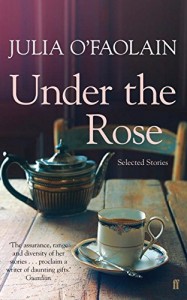Selected Stories
Published by Faber 17 March 2016
384pp, paperback, £13.99
Reviewed by Alison Burns
‘A Citroen raced past, slick as a wet cockroach.’
These twenty stories by acclaimed Irish writer Julia O’Faolain are drawn from anthologies and from her own celebrated collections. Written between 1968 and 2006, they range in setting between Ireland, England, France, Italy and America, as has their author.
O’Faolain was born in London, brought up in Cork and Dublin, educated in Paris and Rome, married in Florence and lived in America, and it shows. Her urbane, cosmopolitan, modern voice is refreshingly direct, pitching us into her stories with vigorous elan and unpredictable language. This effect – that the reader never quite knows what to expect – is illuminated in O’Faolain’s brief ‘Afterword’, where she says that she was often impatient with her characters. This lack of sentimentality (‘emotional toughness’, one reviewer calls it) allows her to explore both everyday life and extremes of emotion with impressive irony.
In ‘Daughters of Passion’, convent girls share a flat in Camden Town. So far, so Edna O’Brien, you might think – then a boyfriend describes the coldness of one of them as ‘like eating Baked Alaska’ (beneath her cold crust he’d counted on finding lava’). In ‘Oh My Monsters!’, a cynical good-time girl berates her sister, who just wants her to be ‘normal’: ‘I have an impulse to die when I make love,’ she reports. ‘That’s why I keep the Nembutal in the garage.’ The delightful ‘Rum and Coke’, a story of romance and hypocrisy featuring the splendidly named Miss Artemis Sheehy, hotel receptionist, could be by William Trevor, were it not for the sharp detachment of O’Faolain’s tone and imagery: a dead adulterer ‘looked worse than dead…put together from that grey stuff with which wasps build their nests…or papier mache made from old, pulped bibles.’
Repression and its dangerous effects is another theme. Rule-bound Mr Condon, in ‘The Knight’, ‘had certainly bound himself by a remarkable number of controls…one might have supposed him intent on containing some centrifugal passion liable to blow him up like a bomb’ – which is indeed what happens. Conversely, the gloriously frank and cynical title story, ‘Under the Rose’, depicts a minor poet of ‘ravenous charm’ cutting a swathe with his stories of incest and his ‘words like oysters’. He should perhaps have been introduced to the spinster pilgrims of ‘Her Trademark’ – those ‘toughish, thirty-fivish, die-hard Dianas’ whose ‘chiffon scarves from Galeries Lafayette wavered on the gaunt masts of their tailor-mades’.
A collection to relish.

